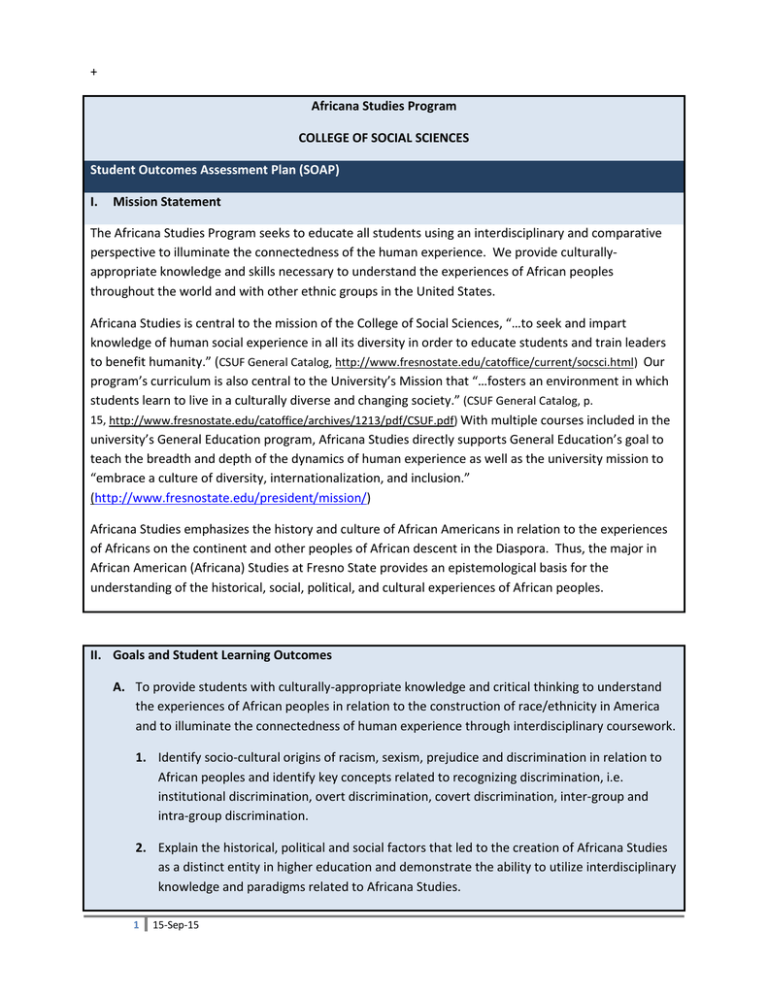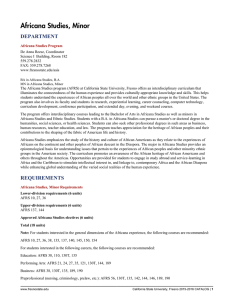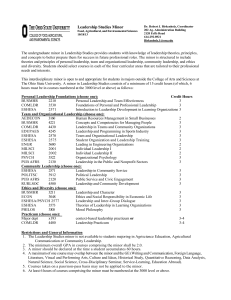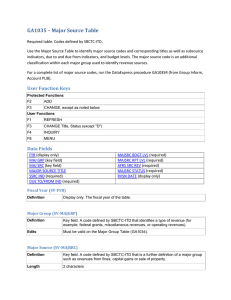+ The Africana Studies Program seeks to educate all students using... Africana Studies Program COLLEGE OF SOCIAL SCIENCES
advertisement

+ Africana Studies Program COLLEGE OF SOCIAL SCIENCES Student Outcomes Assessment Plan (SOAP) I. Mission Statement The Africana Studies Program seeks to educate all students using an interdisciplinary and comparative perspective to illuminate the connectedness of the human experience. We provide culturallyappropriate knowledge and skills necessary to understand the experiences of African peoples throughout the world and with other ethnic groups in the United States. Africana Studies is central to the mission of the College of Social Sciences, “…to seek and impart knowledge of human social experience in all its diversity in order to educate students and train leaders to benefit humanity.” (CSUF General Catalog, http://www.fresnostate.edu/catoffice/current/socsci.html) Our program’s curriculum is also central to the University’s Mission that “…fosters an environment in which students learn to live in a culturally diverse and changing society.” (CSUF General Catalog, p. 15, http://www.fresnostate.edu/catoffice/archives/1213/pdf/CSUF.pdf) With multiple courses included in the university’s General Education program, Africana Studies directly supports General Education’s goal to teach the breadth and depth of the dynamics of human experience as well as the university mission to “embrace a culture of diversity, internationalization, and inclusion.” (http://www.fresnostate.edu/president/mission/) Africana Studies emphasizes the history and culture of African Americans in relation to the experiences of Africans on the continent and other peoples of African descent in the Diaspora. Thus, the major in African American (Africana) Studies at Fresno State provides an epistemological basis for the understanding of the historical, social, political, and cultural experiences of African peoples. II. Goals and Student Learning Outcomes A. To provide students with culturally-appropriate knowledge and critical thinking to understand the experiences of African peoples in relation to the construction of race/ethnicity in America and to illuminate the connectedness of human experience through interdisciplinary coursework. 1. Identify socio-cultural origins of racism, sexism, prejudice and discrimination in relation to African peoples and identify key concepts related to recognizing discrimination, i.e. institutional discrimination, overt discrimination, covert discrimination, inter-group and intra-group discrimination. 2. Explain the historical, political and social factors that led to the creation of Africana Studies as a distinct entity in higher education and demonstrate the ability to utilize interdisciplinary knowledge and paradigms related to Africana Studies. 1 15-Sep-15 3. Analyze race relations and racial hegemony, historically within the U.S., Africa and the African Diaspora. B. To improve the ability of students to think critically, analyze issues, and acquire oral and written communication skills. 4. Demonstrate oral communication and interpretive skills 5. Demonstrate knowledge of style and mechanics of writing and research techniques such as evaluation and documentation of evidence C. To integrate service-learning, provide resources to the greater Fresno community, and to promote international education for global understanding 6. Students will promote awareness and understanding of local and international issues related to race, race relations and tolerance and serve as advocates in the community to provide resources related to Africana Studies in the greater Fresno area. III. Curriculum Map (Courses X Learning Outcomes) The AFRS Major Required courses for the major (from the catalogue): Major requirements (33 units) Lower-division requirements (12 units) AFRS 10, 15, 27 or 36; SOC 125 or PLSI 90 Upper-division requirements (15 units) AFRS 137, 104W, 144, 150 or 164, 189 (3 units) Approved Africana electives (6 units) Consult your academic adviser for approval. http://www.fresnostate.edu/catoffice/archives/1213/ethnicdgr.html#anchor747797 Note: We are including courses that are electives in the program for this assessment matrix and will add new courses as introduced. Our courses do not need to be taken in any particular order. As a benchmark, we expect 2/3 of students to score in the top 30% of the appropriate rubric for each outcome. I = Introduced, R = Reinforced, E = Emphasized Courses 2 Outcome 1 15-Sep-15 Outcome 2 Outcome 3 Outcome 4 Outcome 5 Outcome 6 AFRS 1, 10, 15 I I I I I I AFRS 20, 27, 38 I I I I I I AFRS 35, 36 I I I I I I AFRS 129, 55T R R R R R R AFRS 144, 135 R R R R R R AFRS 130T, 137 R E R E R R AFRS 150, 164, 178 E E E E E E AFRS 189 E E E E E E AFRS 104W E R R E E E Lowerdivision courses I I I I I I Upperdivision courses R, E R, E R, E R, E R, E R, E IV. Assessment Methods A. Direct Measures (at least three) 1. Term Paper Reviews – multiple courses/options – We will review samples of term paper assignments across multiple sections and courses with a common scoring rubric to assess writing competency and writing practices. 2. Portfolio/Final Project Reviews - multiple courses/options – We will review portfolios and/or final projects across multiple courses with a common scoring rubric to assess cumulative 3 15-Sep-15 learning related to specific outcomes in our courses. 3. Essays for APHM/Madden Library and other outreach activities – We will assign a common essay for the art exhibit for African Peoples’ History Month across multiple courses to assess outcomes, especially in relation to the institutionalization of Africana Studies as an academic program. 4. Embedded test questions/essay questions - multiple courses/options – We will assess common essay questions across multiple courses or sections to assess learning outcomes. B. Indirect Measures (Alumni Survey is required) 1. Exit survey for lower division courses – We will administer a qualitative survey to assess learning outcomes in lower division courses 2. Evaluation of Black Gender Conference – We will administer a qualitative survey to gather data on the effectiveness and impact of the conference. 3. Senior Exit Survey – We have developed a comprehensive survey to gather data from graduating seniors. 4. Alumni Survey – We will administer the Alumni Survey to graduated seniors 5. Surveys for writing practices and online tools for teaching writing – We will survey students in our courses to assess the effectiveness of new digital practices. Two of our faculty are participating in an FLC (Faculty Learning Community) to implement and improve writing in our courses using Pearson’s MyWritingLab in AFRS 104W. V. Student Learning Outcomes X Assessment Methods Matrix Assessment Activity Outcome 1 Term Paper Reviews X Portfolio/Project Reviews X X Art Exhibit essays for APHM/Madden Library X X 4 15-Sep-15 Outcome 2 Outcome 3 Outcome 4 X X Outcome 5 Outcome 6 X X X X X Embedded essay test questions X Exit survey for lower division courses X Evaluation of Black Gender Conference X Senior Exit Survey X X X X Alumni Survey X X X X X X X X X Surveys for writing practices and online tools for teaching writing X X X VI. Timeline for Implementation of Assessment Methods and Summary Evaluations Year 2012 to 2013 My Writing Lab Survey (AFRS 104W) Essay Review with common scoring rubric across multiple courses (Black Agitprop art exhibit in Madden Library) Black Gender Conference evaluation (AFRS 137 & 130T) Year 2013 to 2014 Qualitative Survey (AFRS 10) Term Paper review with common scoring rubric (AFRS 135 & 164) Conduct Senior Exit Survey Summary evaluation of assessment activities (2012-2014) 5 15-Sep-15 Year 2014 to 2015 Essay review of outreach activities (AFRS 15, 27, 144) Review common assignment/annotated bibliographies (AFRS 104W, 144) Black Gender Conference evaluation (AFRS 137 & 130T) Year 2015 to 2016 Survey on digital writing practices (AFRS 104W) Portfolio/Final Project Review (AFRS 104W) Survey on service-learning project (AFRS 129) Summary evaluation of assessment activities (2014-2016) Year 2016 to 2017 Review qualitative exit survey (AFRS 15) Conduct Alumni Survey VII. Closing the Loop - Summary Evaluation, Curriculum Adjustment, and Reporting Progress on assessment will be discussed in a faculty meeting at least once per year to discuss results and continue updates of assessment progress. We will meet every two years to review all assessment activities in a summary evaluation and dialogue about needed changes to courses and/or pedagogy. This is known as “closing the feedback loop” in assessment parlance. The chair will report yearly on activities conducted under assessment as part of the year-end report. We expect that all assessment activities will yield some adjustments in pedagogical practices as well as adjustments in our future assessment activities. We plan to assess any new courses and certificates that the program develops. Currently, our program consists of two full-time AFRS faculty and two faculty who teach in History (Dr. Simba, our program coordinator, and Dr. Reese, who teaches ½ time in AFRS). Our SOAP has included a feedback loop from its initiation in 2005-2006, and we are expected to report on outcomes assessment progress annually. The Africana Studies Program at Fresno State is deeply committed to ongoing assessment and the improvement of teaching and learning but resists attempts to impose “one-size-fits-all” standardization akin to the K-12 No Child Left Behind movement. We believe that nurturing more open dialogue about the role of assessment on campus, perhaps creating an FLC, a faculty learning community, geared toward assessment would reinforce positive practices for assessment. Africana Studies involves life-long, transformative learning whose effects are not necessarily visible only in the time that students are on campus and under our guidance. This is the limit of assessment and assessment of assessment. We will 6 15-Sep-15 continue to adjust this SOAP according to the results of assessment activities and dialogue about our results as we have been doing so for a number of years. Addendum: Context and background for Africana Studies as a program and discipline The Africana Studies program at California State University, Fresno is one of more than 1,000 such programs in the United States. Started in 1970 under the umbrella of “Ethnic Studies,” the program has gone through a number of changes. Between 1971 and 1973, “Ethnic Studies” had five programs namely, Black Studies, Native American Studies, Armenian Studies, Asian-American Studies, and La Raza Studies. From 1989 until recently, the Ethnic Studies Program has been made up of just two “Ethnic” groups--African American and American Indians as the other programs moved out to establish their own separate departments and identities. Other significant changes occurred in 1998 when a new major in African American Studies and a minor in American Indian Studies were instituted. In the fall of 1999, the first majors in the African American Studies B.A. degree program were enrolled. Based on the reality of our current course offerings and available “Ethnic” concentrations for a period of 15 years, we proposed a name change to Africana and American Indian Studies Program effective Fall 2003. In Spring 2010, American Indian Studies moved to the Anthropology Department and the program’s name became solely “Africana Studies.” The original SOAP plan was completed and accepted in 2006 with our first program review, and this current plan builds on activities previously finished from our first SOAP. AFRICANA STUDIES PROGRAM LOOKING FORWARD: Three new courses are in process for the program: AFRS 139: The Black Male Experience [Formerly AFRS 130T], AFRS 142: Hip-Hop Culture: Globalization, Gender, and Representation [Formerly AFRS 55T] and AFRS 127: African American Autobiography. We will initiate new assessment activities for these courses when approved. 139 and 142 have been taught as topics courses for the past three to four years. We will make adjustments to this SOAP to include any new faculty and any new courses they develop. Certificates Currently the Certificate in Racial Understanding is jointly offered by the Africana Studies Program and the Social Work Education Department. We are currently seeking collaboration with a number of other departments to expand our offerings in certificates. The certificates will be designed to prepare students to be practicing professionals in fields that analyze and work directly in diverse communities. Graduates of the certificate program will develop a strong grasp on the histories, media representations, social contexts, and lived-experiences of Africana communities. It is the goal of our certificates to promote a greater familiarity with the ways race, gender, and sexuality function to help make Fresno State graduates more competitive. Student Life and Community Events The offices of the Africana Studies program serve as a resource and information center for several African American student organizations and the community at large. The program co-sponsors and supports various student and community organizations that build bridges for understanding and mutual support while promoting students’ personal, academic, and career goals. These organizations include 7 15-Sep-15 Uhuru Na Umoja (the African American student newspaper, a supplement to The Collegian), Fresno State Gospel Choir, Africana Studies Advisory Council, African Peoples’ History Month (APHM), Africana Studies Student Association (ASSA), Black Students United (BSU), the African American Student Recruitment Conference, Black Faculty and Staff Association, the African American Recognition Ceremony for Graduates, the African American EDGE mentoring program, and the African American Alumni Chapter. Other activities that faculty co-sponsor at Fresno State include the Poetry Jam, Women’s History Month, International Education Week, and Diversity Week. 8 15-Sep-15


